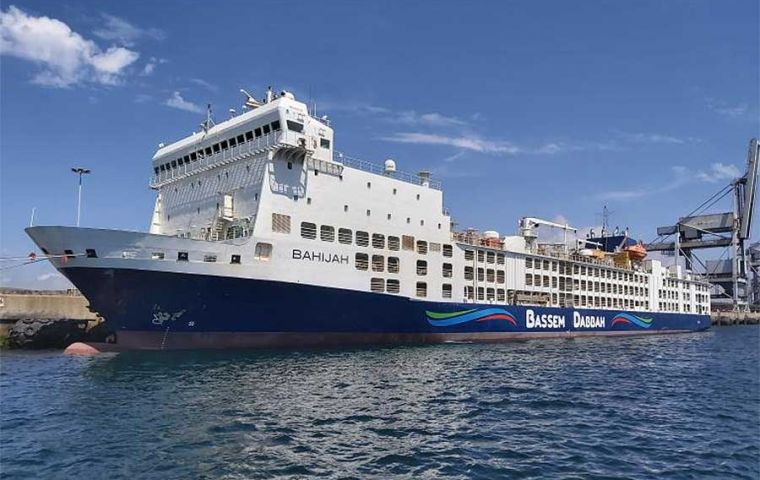MercoPress. South Atlantic News Agency
Red Sea attacks force vessel with 16,000 live sheep and cattle to return to Australia
 Some 14,000 sheep and 2,000 cattle are stuck on board the MV Bahijah in temperatures close to 41C (104F) in Perth , according to farmers and export agents
Some 14,000 sheep and 2,000 cattle are stuck on board the MV Bahijah in temperatures close to 41C (104F) in Perth , according to farmers and export agents A ship carrying 16,000 sheep and cattle to Israel and that had been stranded off the coast of Australia in extreme heat conditions has returned to a Perth port. MV Bahijah abandoned its journey through the Red Sea - where Houthi fighters in Yemen have been attacking ships - leaving the animals stuck on board for weeks.
The vessel had remained at sea pending an Australian decision on whether the livestock could be offloaded, alleging bio-security risks. However it is unclear if the animals will be allowed to disembark from the vessel.
Australia's agriculture department said that veterinarians who had examined the animals found no “significant health, welfare or environmental” concerns and that it was determining its next steps. In an earlier update, it stressed that any livestock arriving in the country would be subject to “strict bio-security controls” and that their “health and welfare” was the highest priority.
Australia's government says its bio-security rules, some of the toughest on the planet, have kept the country free from many of the world's most invasive pests and diseases.
The incident highlights the far-reaching consequences of recent attacks on ships by Houthi militia, who are backed by Iran.
The fighters began attacking ships in response to Israel's actions in the Palestinian enclave of Gaza. They have insisted they only target ships linked to Israel and its allies.
The vessel in question was bound for Israel, 33 day trip, when it set sail from Fremantle in Perth on 5 January. The animals were among hundreds of thousands sent from Australia to the Middle East every year.
The government says it told the ship to return to Australia on 20 January, citing the “exceptional circumstances” at work.
The Red Sea has become a critical shipping route which provides access to the Suez Canal - which itself offers the quickest way for ships to pass between Asia and Europe.
Ongoing insecurity has prompted international shipping firms to take long diversions around southern Africa, causing severe disruption to global supply chains.
Some 14,000 sheep and 2,000 cattle are stuck on board the Bahijah in temperatures close to 41C (104F), according to farmers and export agents
Last April, New Zealand banned the live export of animals after an incident that saw thousands of cows drown in a shipwreck. The Australian government has pledged to outlaw the export of live sheep.
The department said the ship was being replenished with supplies ahead of its possible departure following discussions with the exporter.
The exporter, Israel-based Bassem Dabbah, earlier flagged a plan with the department to remove some of the animals to create more space on board, before sending them back out on a longer journey that would avoid the Red Sea.




Top Comments
Disclaimer & comment rulesCommenting for this story is now closed.
If you have a Facebook account, become a fan and comment on our Facebook Page!